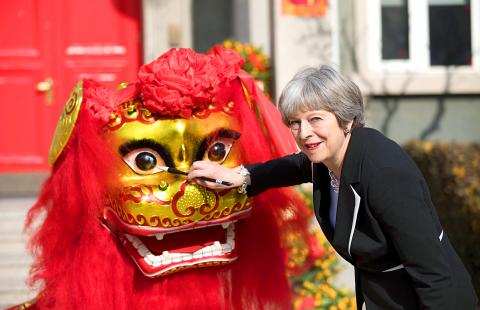Hounded by Brexit rows at home, British Prime Minister Theresa May yesterday met Chinese President Xi Jinping (習近平) to seek deeper trade ties after Britain leaves the EU.
May began her trip with plans to announce £9 billion (US$12.7 billion) in business deals, an agreement to end a ban on British beef and promises to seek more trade opportunities, but criticism in London over her domestic agenda and her handling of Britain’s contentious divorce with the EU loomed large, prompting her to declare she was “not a quitter” before her arrival.
May held talks with Xi at the Diaoyutai State Guest House after visiting an agricultural sciences academy, but there were no immediate details of their meeting.

Photo: EPA
The BBC reported that May, who was expected to raise environmental concerns, would present Xi with a box set of the network’s Blue Planet II series, with a personal message from presenter David Attenborough.
Brexit crept into her talks with Chinese Premier Li Keqiang (李克強) on Wednesday, though her Chinese counterpart reassured her that their “golden era” of relations would not be affected by London’s EU departure.
“As a trade and strategic partner of both Britain and the EU, China certainly hopes that the result [of Brexit] will be good for both sides,” said Cui Hongjian (崔洪建), director of the European studies department at the China Institute of International Studies. “If it comes to a double-lose result, that will be also unfavorable to China.”
China worries that Britain’s EU exit would remove a pro-free-trade force from the bloc and give rise to protectionism, he said.
Wooing China is part of London’s broader strategy to seek deeper trade ties with nations beyond Europe’s borders after Britain leaves the EU next year.
Britain runs a £25.4 billion trade deficit with the Asian giant and only 3.1 percent of British exports go to the nation, IHS Markit Asia-Pacific chief economist Rajiv Biswas said.
“A key focus for PM May’s visit will need to be on how to improve market access for UK exports of goods and services into the Chinese market,” Biswas said.
May on Wednesday said that the two nations had agreed new measures to improve such access, including lifting a ban on British beef exports to China within six months.
She also cautiously welcomed China’s Belt and Road Initiative, a massive infrastructure project aimed at reviving ancient Silk Road trade routes, but she stressed that the two nations would continue to work together to ensure that the endeavor “meets international standards.”
The British prime minister was also under pressure to address the political situation in Hong Kong and human rights abuses in mainland China, but she had yet to make public statements about either matter during her visit, which ends in Shanghai today.
Before her trip former British governor of Hong Kong Chris Patten sent a letter to Downing Street saying the territory was facing “increasing threats to the basic freedoms, human rights and autonomy.”

CARROT AND STICK: While unrelenting in its military threats, China attracted nearly 40,000 Taiwanese to over 400 business events last year Nearly 40,000 Taiwanese last year joined industry events in China, such as conferences and trade fairs, supported by the Chinese government, a study showed yesterday, as Beijing ramps up a charm offensive toward Taipei alongside military pressure. China has long taken a carrot-and-stick approach to Taiwan, threatening it with the prospect of military action while reaching out to those it believes are amenable to Beijing’s point of view. Taiwanese security officials are wary of what they see as Beijing’s influence campaigns to sway public opinion after Taipei and Beijing gradually resumed travel links halted by the COVID-19 pandemic, but the scale of

TRADE: A mandatory declaration of origin for manufactured goods bound for the US is to take effect on May 7 to block China from exploiting Taiwan’s trade channels All products manufactured in Taiwan and exported to the US must include a signed declaration of origin starting on May 7, the Bureau of Foreign Trade announced yesterday. US President Donald Trump on April 2 imposed a 32 percent tariff on imports from Taiwan, but one week later announced a 90-day pause on its implementation. However, a universal 10 percent tariff was immediately applied to most imports from around the world. On April 12, the Trump administration further exempted computers, smartphones and semiconductors from the new tariffs. In response, President William Lai’s (賴清德) administration has introduced a series of countermeasures to support affected

Pope Francis is be laid to rest on Saturday after lying in state for three days in St Peter’s Basilica, where the faithful are expected to flock to pay their respects to history’s first Latin American pontiff. The cardinals met yesterday in the Vatican’s synod hall to chart the next steps before a conclave begins to choose Francis’ successor, as condolences poured in from around the world. According to current norms, the conclave must begin between May 5 and 10. The cardinals set the funeral for Saturday at 10am in St Peter’s Square, to be celebrated by the dean of the College

CROSS-STRAIT: The vast majority of Taiwanese support maintaining the ‘status quo,’ while concern is rising about Beijing’s influence operations More than eight out of 10 Taiwanese reject Beijing’s “one country, two systems” framework for cross-strait relations, according to a survey released by the Mainland Affairs Council (MAC) on Thursday. The MAC’s latest quarterly survey found that 84.4 percent of respondents opposed Beijing’s “one country, two systems” formula for handling cross-strait relations — a figure consistent with past polling. Over the past three years, opposition to the framework has remained high, ranging from a low of 83.6 percent in April 2023 to a peak of 89.6 percent in April last year. In the most recent poll, 82.5 percent also rejected China’s